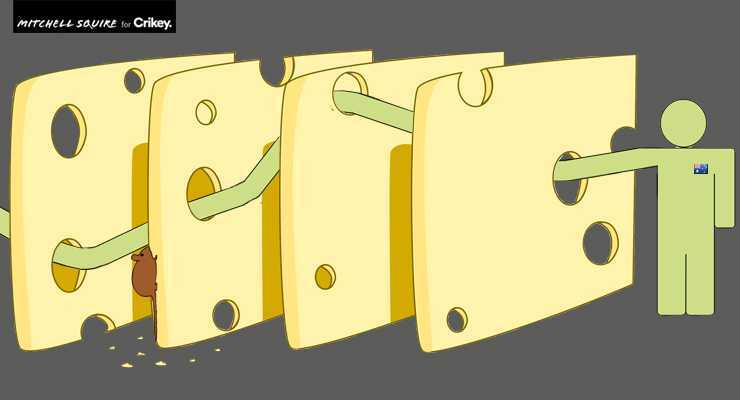
Christian Porter’s so-called blind trust has received an official tick of approval, vindicating his strong stance for the privacy of people who wish to give hundreds of thousands of dollars to a sitting member of federal Parliament and not have their identities ever known, and exemplifying the Morrison government’s general policy of getting out of all our lives.
You’ll recall that in September the former attorney-general updated his entry in the registry of members’ interests, with the gloriously uninformative disclosure of “part contribution of my fees by a blind trust known as the Legal Services Trust. As a potential beneficiary I have no access to information about the conduct and funding of the trust.”
The Labor Party objected, making a formal complaint to the Standing Committee of Privileges and Members’ Interests, which duly investigated and has tabled its report.
The committee’s answer: it “concludes that the declaration by [Porter] was consistent with his obligations under the resolution on the registration of members’ interests”.
The committee also, politely, said well, that’s bullshit: “As the current arrangements are inadequate, the committee considers that additional detail within the requirements of the register would assist members in meeting the expectations of the house.”
Therefore it’s looking into changes “to ensure the requirements more comprehensively reflect the intent and integrity of the register”.
The integrity horse bolted long ago. It would have been perverse for the Coalition-majority committee to try to pretend that this is an acceptable state of affairs, so it tiptoed down the middle: Porter is within the letter of the law, but clearly not its spirit, so we shall have to tighten up the wording before every MP in the building starts declaring “blind trust” beneficence as their principal source of income.
Is the committee technically correct? The rules require members to declare, relevantly, “gifts valued at more than $300” and “any other interests where a conflict of interest with a member’s public duties could foreseeably arise or be seen to arise”.
Porter’s disclosure was that there’s this trust which has been paying some of his legal fees, but won’t say whose money is in the trust, i.e. who the donors are. He could ask who the donors are, or maybe he already has — we just don’t know. He says he has “no access to information” about that, which is not quite the same thing as either asking or being told.
To be clear, this is not a blind trust. It is a discretionary trust, of which Porter is a beneficiary. The terms of the trust — what the trustee’s powers are and to what extent the donors control the trustee’s decisions — are unknown to us.
It’s definitely a gift over $300 and the potential for conflict is obvious, so it is a disclosable interest. Porter’s argument would be that the situation is no different from him waking up one morning and finding a bag outside his door with $100,000 cash in it and a note saying “for your legal fees, love, Miss Havisham (not my real name)”. He would properly disclose the gift on the register, as an anonymous donation. Nothing more he can or need do to comply with the disclosure requirements.
If Porter does know where the money came from, he should have disclosed it. We must assume then that he is blissfully ignorant, and in that case there is nothing more for him to disclose under the rules, because there is nothing more he knows and the rules don’t oblige him to take any steps to find out. This extends to the trustee’s identity; we must assume Porter doesn’t know that either (remarkably).
So the committee is presumably right in both respects. Porter has found a handy loophole in the slack drafting of the requirements — and that is a very bad thing.
As the committee quoted from the explanatory notes to the rules: “No form can cover all possible circumstances and members should consequently bear in mind the purpose and spirit of the return in deciding which matters should be registered.”
That is an expression of hope that MPs will be guided by the public interest, not look for gaps to exploit.
Some hope.
Bravo, the former attorney-general of the Commonwealth. What an ornament to his profession, the defenders of both the letter and the spirit of the law.








Who believes Porter doesnt know who paid the money? Whoever it is needs to get in touch with me now. I have a bridge for sale. The blind trust is not to conceal the donor from him but from us, the people who pay for the gravy train our beloved politicians rape and abuse.
The whole point of donating to corrupt politicians is put them under obligation to you. If they dont know who they are obliged to they cant return the favour. Therefore you can bet he knows. Ditto all the other trashbags from Scomo down.
So Australians don’t get to know who funds the private legal fights of the nation’s highest legal office, even when said officer is defending charges of rape. I see.
Edit, accusations of rape.
“…additional detail within the requirements of the register will assist members in meeting the expectations of the house.” Anyone see this happening anytime soon?
Presumably both Schmorrison and Mr Porter hope that the entire electorate has a blind trust; in the LNP/IPA, that is.
Since neither (nor indeed pretty much the entire cabinet and the backbench) has done anything at all to merit trust of any kind, one presumes they’re pinning their hopes on us forgetting all of this palaver by the time the election rolls around.
Not this little black duck. I’m making notes.
(Not that I would vote for this maundering bunch of incompetents anyway).
One could hope for say, a permanent Parliamentary Oversight Commission that would have Royal Commission/ICAC like powers to keep our pollies on all sides on the straight & narrow..